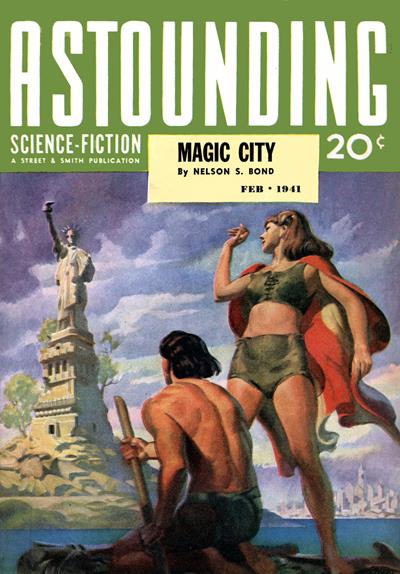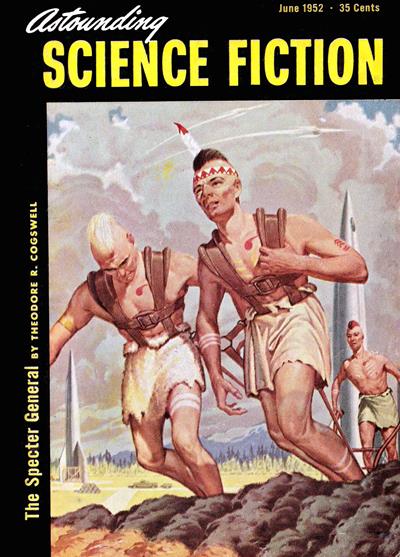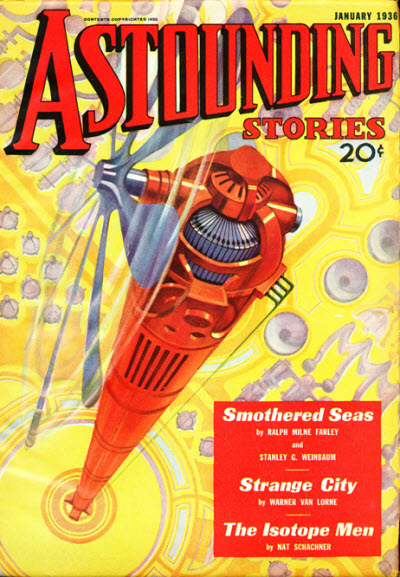
Part of Series
Vol 26, No 6. Contents: 6 • Invitation • [Editorial (Astounding)] • essay by John W. Campbell, Jr. [as by The Editor] 9 • Magic City • [Meg (Nelson S. Bond) • 3] • novelette by Nelson S. Bond 37 • Castaway • short story by Robert Moore Williams 48 • Trouble on Tantalus • novelette by P. Schuyler Miller 67 • In Times to Come (Astounding, February 1941) • [In Times to Come (Astounding)] • essay by The Editor 67 • The Analytical Laboratory: December 1940 (Astounding, February 1941) • [The Analytical Laboratory] • essay by The Editor 68 • "—And He Built a Crooked House"? • novelette by Robert A. Heinlein 84 • Completely Automatic • short story by Theodore Sturgeon 98 • The Klystron • essay by Stanley R. Short 107 • The Best-Laid Scheme • short story by L. Sprague de Camp 116 • Gypped! • essay by John W. Campbell, Jr. [as by Arthur McCann] 117 • Sixth Column (Part 2 of 3) • serial by Robert A. Heinlein [as by Anson MacDonald] 156 • Brass Tacks (Astounding, February 1941) • [Brass Tacks] • essay by The Editor 160 • Science Discussions (Astounding, February 1941) • essay by The Editor 160 • Letters. 【 PREVIOUS ISSUE ← February 1941 → NEXT ISSUE 】
Authors


Works of American science-fiction writer Robert Anson Heinlein include Stranger in a Strange Land (1961) and The Moon Is a Harsh Mistress (1966). People often call this novelist "the dean of science fiction writers", one of the most popular, influential, and controversial authors of "hard science fiction." He set a high standard for science and engineering plausibility and helped to raise the standards of literary quality of the genre. He was the first science-fiction writer to break into mainstream, general magazines such as The Saturday Evening Post, in the late 1940s. He was also among the first authors of bestselling, novel-length science fiction in the modern, mass-market era. Also wrote under Pen names: Anson McDonald, Lyle Monroe, Caleb Saunders, John Riverside and Simon York.
Peter Schuyler Miller (February 21, 1912 – October 13, 1974) was an American science fiction writer and critic. Miller was raised in New York's Mohawk Valley, which led to a lifelong interest in the Iroquois Indians. He pursued this as an amateur archaeologist and a member of the New York State Archaeological Association. He received his M.S. in chemistry from Union College in Schenectady. He subsequently worked as a technical writer for General Electric in the 1940s, and for the Fisher Scientific Company in Pittsburgh from 1952 until his death. Miller died October 13, 1974 on Blennerhassett Island, West Virginia. He was on an archaeological tour to the "Fort Ancient culture" site west of Parkersburg at the time. Miller wrote pulp science fiction beginning in the 1930s, and is considered one of the more popular authors of the period. His work appeared in such magazines as Amazing Stories, Astounding, Comet, The Magazine of Fantasy and Science Fiction, Marvel Tales, Science Fiction Digest, Super Science Stories, Unknown, Weird Tales, and Wonder Stories, among others. An active fan of others' work as well as an author, he is also known as an early bibliographer of Robert E. Howard's "Conan" stories in the 1930s, together with his friend John D. Clark. Miller gradually shifted into book reviewing beginning in 1945, initially for Astounding Science Fiction and later for its successor, Analog. He began a regularly monthly review column in the former in October, 1951. As a critic he was notable for his enthusiasm for a wide coverage of the science fiction field. He was awarded a special Hugo Award for book reviews in 1963. His extensive collection of papers, maps, books and periodicals, accumulated largely as a result of his review work, was donated to the Carnegie Museum after his death by his sister Mary E. Drake. They now form the basis of the P. Schuyler Miller Memorial Library at the Edward O'Neill Research Center in Pittsburgh.

Theodore Sturgeon (1918–1985) is considered one of the godfathers of contemporary science fiction and dark fantasy. The author of numerous acclaimed short stories and novels, among them the classics More Than Human, Venus Plus X, and To Marry Medusa, Sturgeon also wrote for television and holds among his credits two episodes of the original 1960s Star Trek series, for which he created the Vulcan mating ritual and the expression “Live long and prosper.” He is also credited as the inspiration for Kurt Vonnegut’s recurring fictional character Kilgore Trout. Sturgeon is the recipient of the Hugo Award, the Nebula Award, and the International Fantasy Award. In 2000, he was posthumously honored with a World Fantasy Award for Life Achievement.


